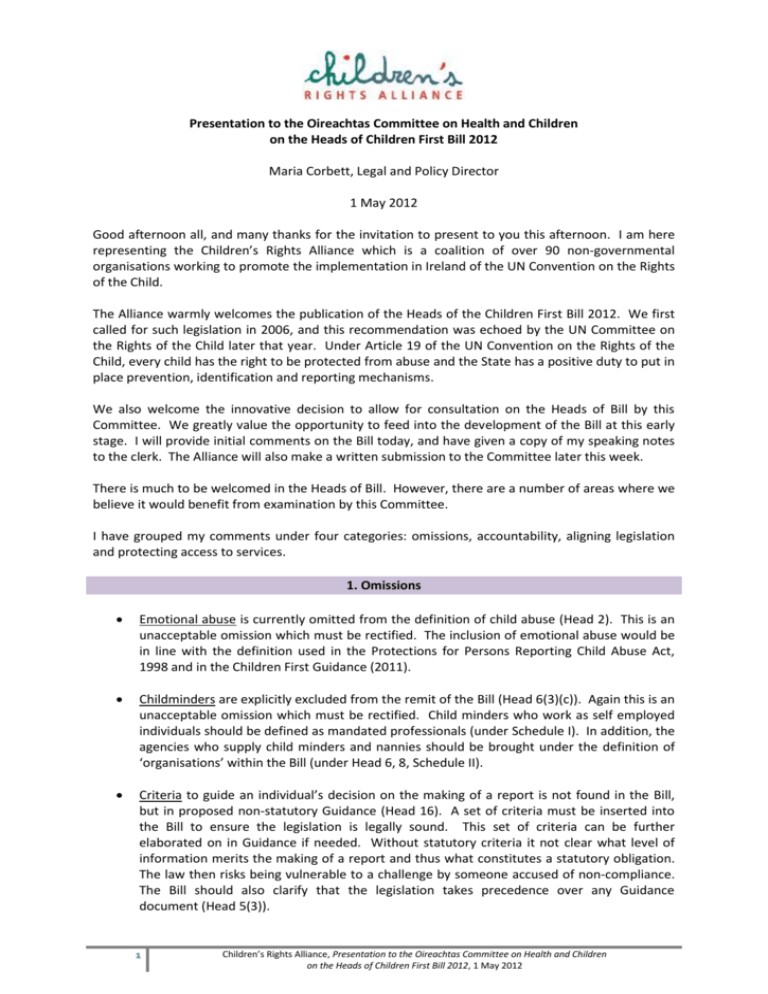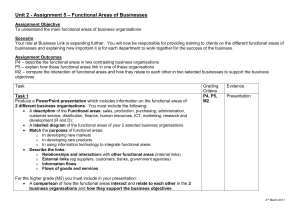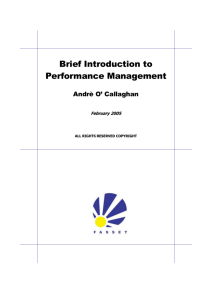Presentation to the Oireachtas Committee on Health and Children
advertisement

Presentation to the Oireachtas Committee on Health and Children on the Heads of Children First Bill 2012 Maria Corbett, Legal and Policy Director 1 May 2012 Good afternoon all, and many thanks for the invitation to present to you this afternoon. I am here representing the Children’s Rights Alliance which is a coalition of over 90 non-governmental organisations working to promote the implementation in Ireland of the UN Convention on the Rights of the Child. The Alliance warmly welcomes the publication of the Heads of the Children First Bill 2012. We first called for such legislation in 2006, and this recommendation was echoed by the UN Committee on the Rights of the Child later that year. Under Article 19 of the UN Convention on the Rights of the Child, every child has the right to be protected from abuse and the State has a positive duty to put in place prevention, identification and reporting mechanisms. We also welcome the innovative decision to allow for consultation on the Heads of Bill by this Committee. We greatly value the opportunity to feed into the development of the Bill at this early stage. I will provide initial comments on the Bill today, and have given a copy of my speaking notes to the clerk. The Alliance will also make a written submission to the Committee later this week. There is much to be welcomed in the Heads of Bill. However, there are a number of areas where we believe it would benefit from examination by this Committee. I have grouped my comments under four categories: omissions, accountability, aligning legislation and protecting access to services. 1. Omissions Emotional abuse is currently omitted from the definition of child abuse (Head 2). This is an unacceptable omission which must be rectified. The inclusion of emotional abuse would be in line with the definition used in the Protections for Persons Reporting Child Abuse Act, 1998 and in the Children First Guidance (2011). Childminders are explicitly excluded from the remit of the Bill (Head 6(3)(c)). Again this is an unacceptable omission which must be rectified. Child minders who work as self employed individuals should be defined as mandated professionals (under Schedule I). In addition, the agencies who supply child minders and nannies should be brought under the definition of ‘organisations’ within the Bill (under Head 6, 8, Schedule II). Criteria to guide an individual’s decision on the making of a report is not found in the Bill, but in proposed non-statutory Guidance (Head 16). A set of criteria must be inserted into the Bill to ensure the legislation is legally sound. This set of criteria can be further elaborated on in Guidance if needed. Without statutory criteria it not clear what level of information merits the making of a report and thus what constitutes a statutory obligation. The law then risks being vulnerable to a challenge by someone accused of non-compliance. The Bill should also clarify that the legislation takes precedence over any Guidance document (Head 5(3)). 1 Children’s Rights Alliance, Presentation to the Oireachtas Committee on Health and Children on the Heads of Children First Bill 2012, 1 May 2012 2. Accountability Roles: The Bill sets out two new roles for the HSE – to provide an information and advisory service to individuals and organisations on compliance with the legislation, and to be a regulator of those same individuals and organisations in their compliance with the legislation (Head 12). In addition, the HSE itself will also need to be the subject of regulation. This obviously poses a conflict of interest and so it would seem more appropriate for the regulatory role to be assigned to another agency, for example the Health Information and Quality Authority (HIQA). Penalties: There are four penalties for failure to appropriately report a concern or allegation, which vary depending on the person’s level of responsibility. 1. Employees: The introductory text notes that employees may be penalised through existing labour legislation but the Bill is silent on this matter (in Head 10). 2. Volunteers: Volunteers may be penalised by being prohibited from volunteering in the organisation (Head 10(4)). This penalty has knock-on implications for access to future employment (and volunteering opportunities) and damage to ones’ good name: both constitutionally protected rights. The prohibition would likely met the criteria for ‘soft information’ and thus be communicated to the National Vetting Bureau. The focus of this penalty is to penalise an individual’s failure to act, rather than on supporting the individual’s capacity to comply with the legislation. We believe it would be more appropriate to focus on how the HSE can support organisations to fulfil their statutory duty under the Bill in relation to training and informing volunteers (under Head 7(9, 11, 12). In some cases, the inaction of the volunteer will fall under the scope of the Withholding of Information on Offences against Children and Vulnerable Persons Bill 2012. 3. Mandated Professionals and Designated Officers – may face a criminally prosecution with a potential penalty of a Class A fine and/or imprisoned for up to five years (Heads 11(3) & 20). Given that a criminal sanction will also exist under the Withholding of Information Bill (with a penalty of up to ten years imprisonment), consideration should be given to develop a civil offence, with a lower evidential threshold and corresponding penalty, for a breach of this Bill. 4. Designated Officers: Where the HSE is of the opinion that the organisation is breaching the legislation it can prohibit specific organisational activities by serving the Designated Officer with an Improvement or Prohibition Notice. The sanction is not an individual sanction but an organizational one and so we believe the Notices should be served on the organization not on the Designated Officer. The legal responsibility for compliance with the Bill should be reconstructed. The responsibility should rest with the organisation (the corporate entity), rather than on an identified individual within the organisation (in many cases the Designated Officer will be an unpaid non-professional volunteer). In a parallel development, the Scheme of the National Vetting Bureau Bill 2011 attaches liability for compliance to the employer. 2 Children’s Rights Alliance, Presentation to the Oireachtas Committee on Health and Children on the Heads of Children First Bill 2012, 1 May 2012 3. Aligning Legislation There is a need to align the provisions of all relevant legislation to ensure a coherent legal approach, clarity for service providers, streamlined administrative requirements, and cost efficiency for the State. Relevant legislation includes the existing child care laws, the Protections for Persons Reporting Child Abuse Act 1998 and the three proposed laws – the Children First Bill, the National Vetting Bureau Bill 2011 and the Criminal Justice (Withholding of Information on Offences against Children and Vulnerable Persons) Bill 2012. Issues which need close examination include: o The definition of organisations and individuals who fall within the legislative scope differs between this Bill, the Vetting Bill and the Children First Guidance. o As currently proposed under the Children First and Vetting Bills, organisations will be asked to register with two different statutory bodies – the HSE and the Bureau – and nominate a contact person to each of the bodies – a Designated Officer and a Liaison Officer. The two bodies will maintain separate registers of registered organisations and details of contact people. 4. Protecting Access to Services Many of our member organisations have contacted us over the past few days in relation to this Bill. A key concern for them is how the Bill, read alongside the Withholding of Information Bill, will impact on their ability to provide children with counselling and advice services, particularly in the area of sexual health. Mixed messages and practice abound. It is unclear if the intent of the legislation to require all consensual ‘sexual activity’ between 16 year olds and under to be reported. The Alliance believes it is not appropriate for society to use legislation, such as criminal prosecution, to deter young people from engaging in consensual peer sexual activity. Investment in services in recent years has brought about significant positive developments, including empowering young people to make responsible decisions about their own behaviour. We need to protect the right of young person to access sexual health services, advice and information without fear of criminalisation. We believe it would be of great value if this Committee could focus on this issue over the coming weeks. I would like to conclude by thanking the Committee for the opportunity to present today and wish you well in your work over the coming weeks. 3 Children’s Rights Alliance, Presentation to the Oireachtas Committee on Health and Children on the Heads of Children First Bill 2012, 1 May 2012



![1[7. MINISTRY OF PRIMARY AND MASS EDUCATION] 1](http://s3.studylib.net/store/data/008790481_1-dc16bd6475807709cfe43fd7dc8fd0e5-300x300.png)